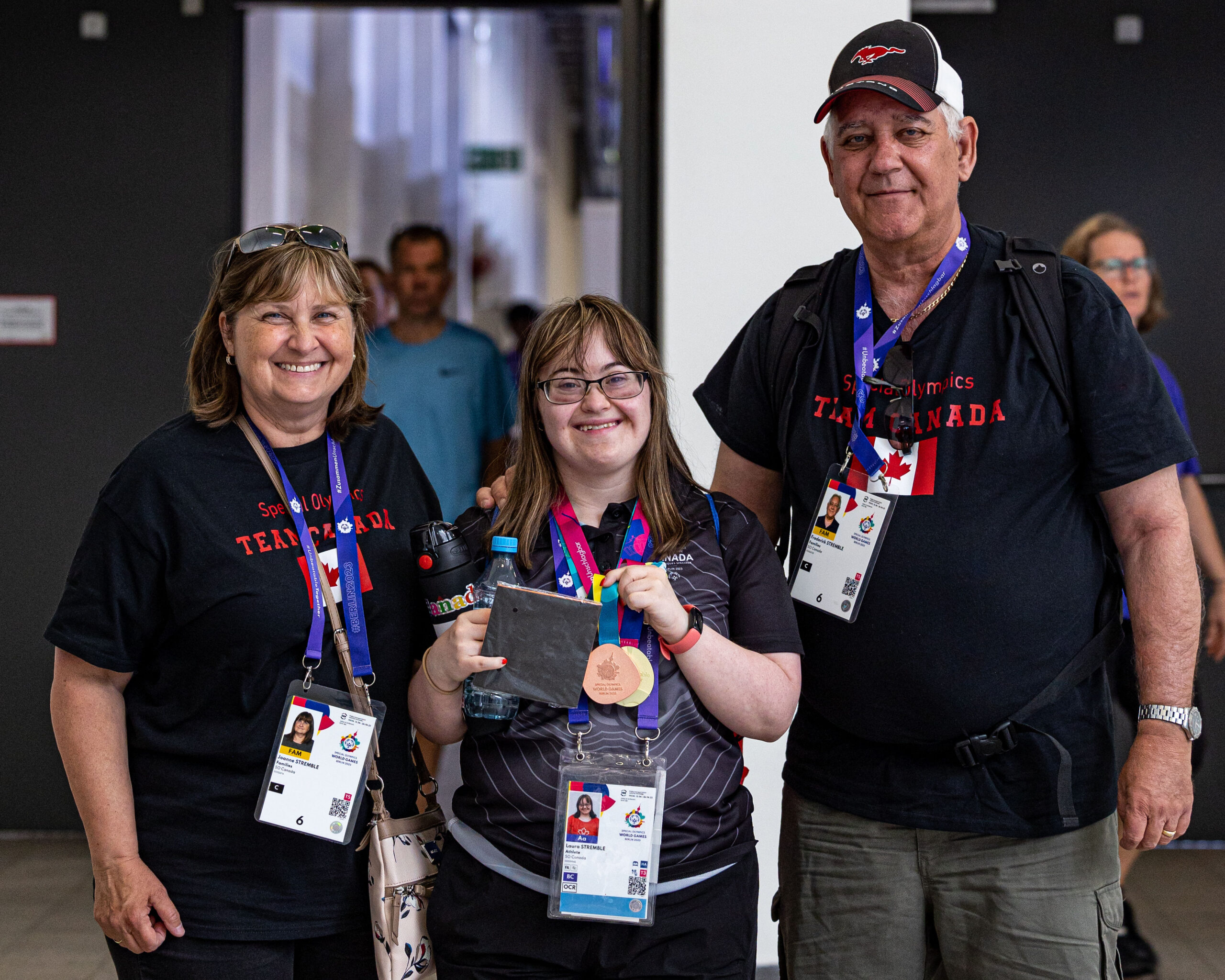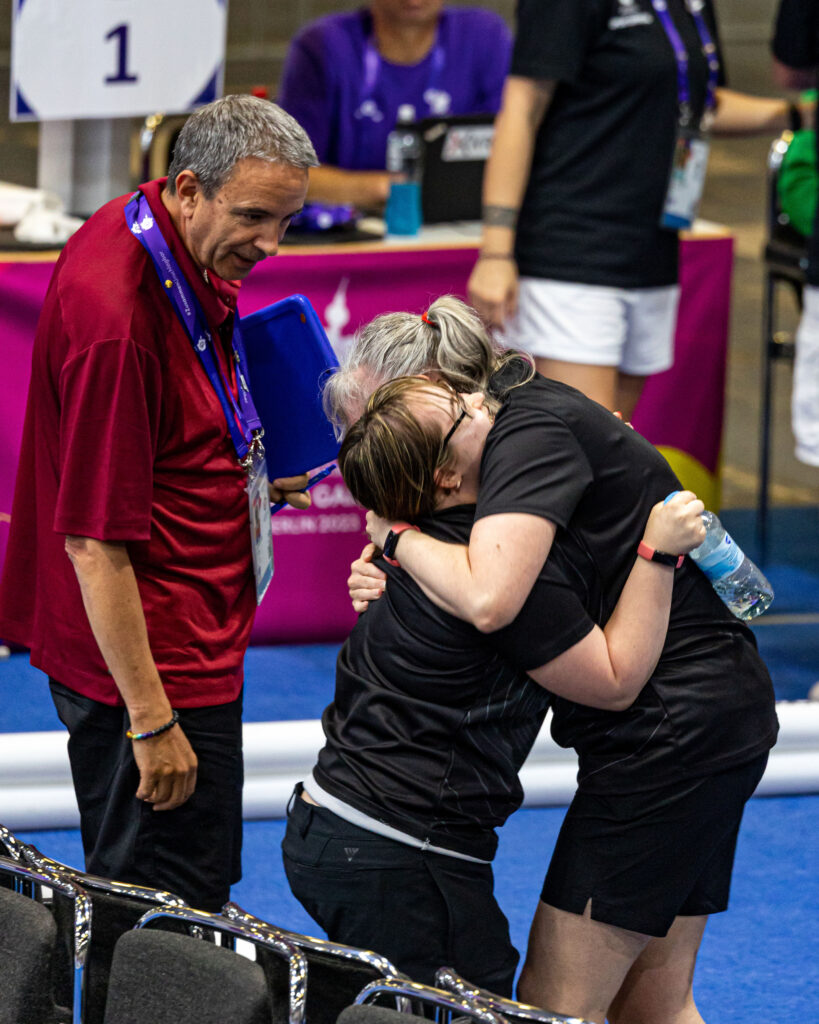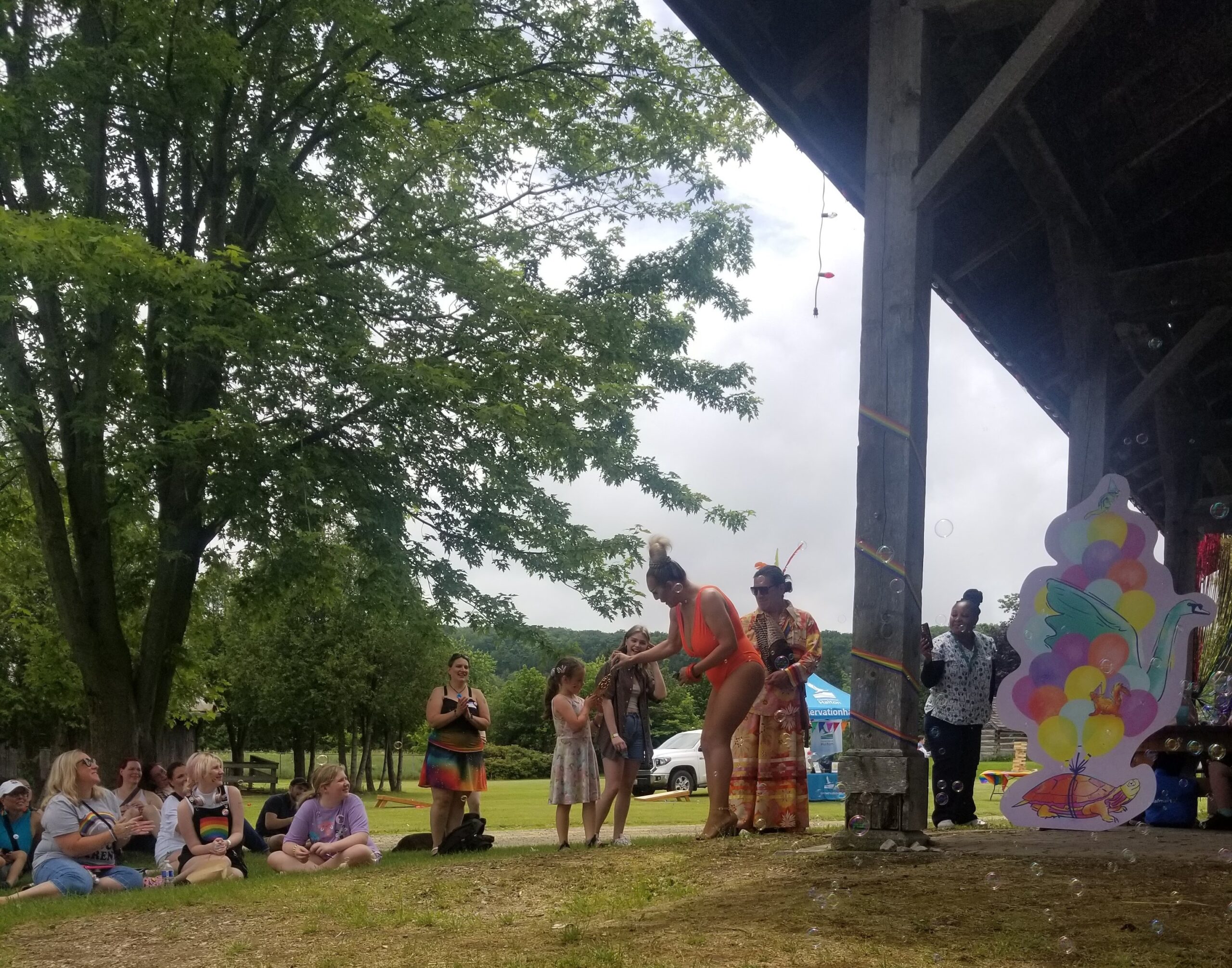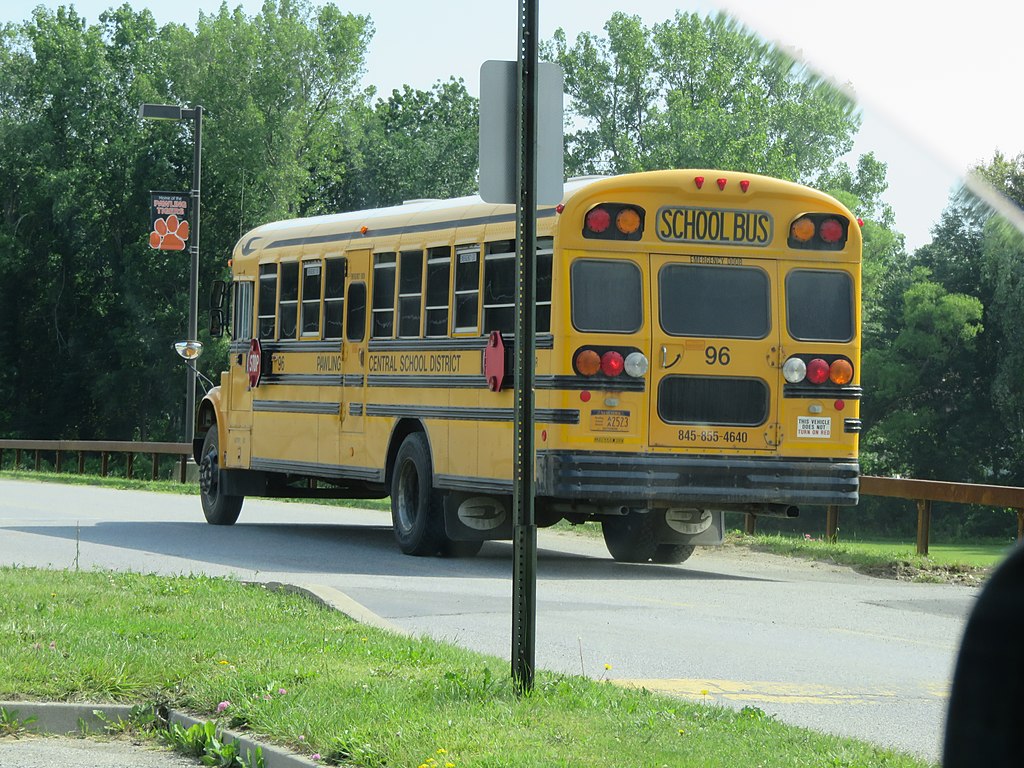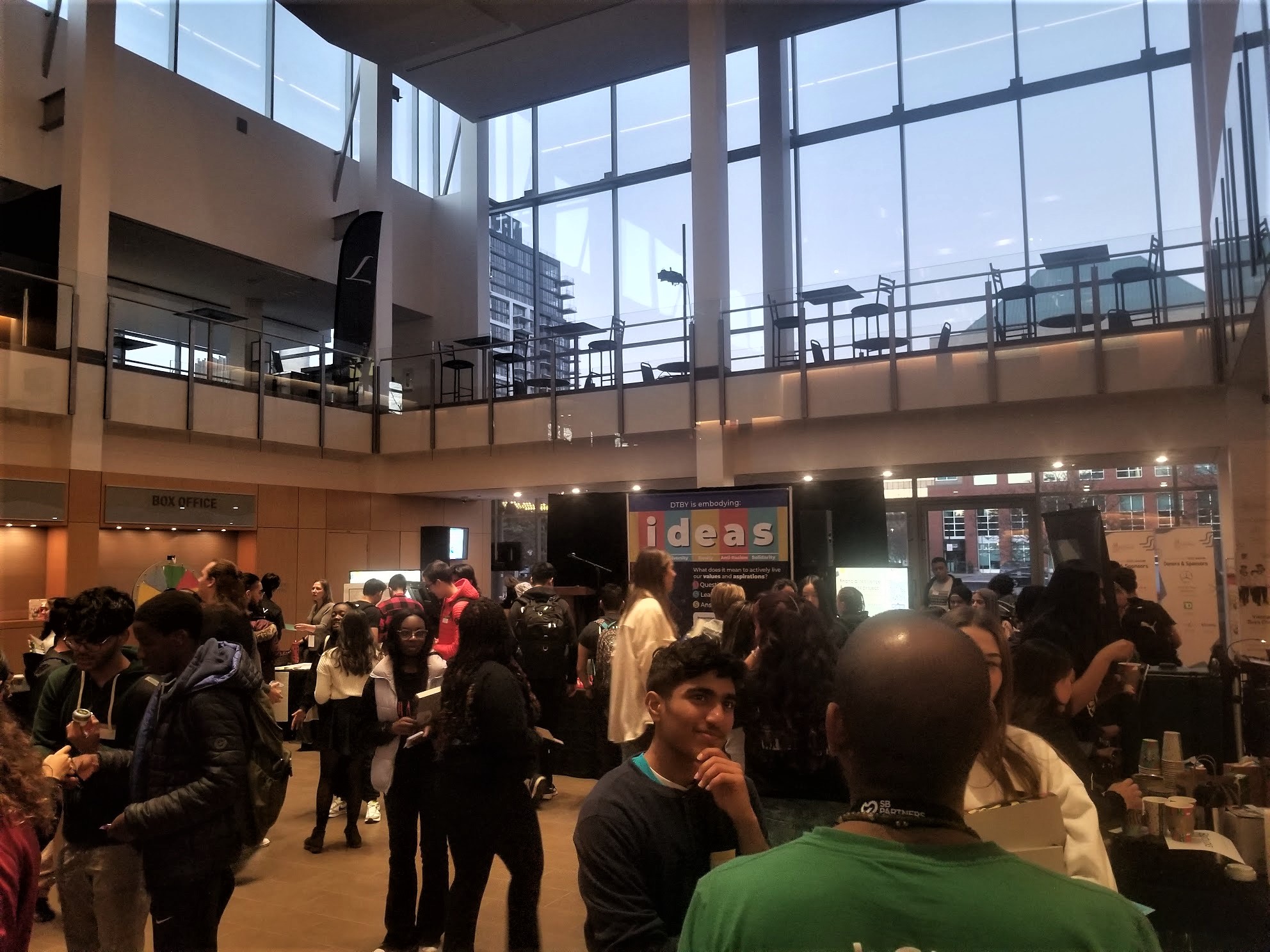Not even a month off her gold and bronze Special Olympics wins in bocce, and Laura Stremble, Special Olympics Burlington’s first athlete to go to the world games, is already planning for her next round of competition — in a totally different sport.
This multi-sport athlete is still feeling “amazing” after her big wins, and still trying to figure out where her medals will live, but is looking forward to the rhythmic gymnastics provincials next year — rhythmic gymnastics, after all, was her first sports love.
Laura, who participates in Special Olympics Burlington’s programs, started with rhythmic gymnastics about 12 years ago. Then, because her older brother John bowled competitively, she thought, “Maybe I should bowl as well!” (Laura’s mom, Joanne, says it was one of those “If he can do it, I can do it” things.) From there, it was only a short jump to bocce, and, even better, gives her another summer sport to play. Laura plays soccer and bocce in the summer, and gymnastics and bowling in the winter.
And now it’s a bit of a family affair — Laura’s uncle coaches her soccer team, and Joanne coaches bocce and bowling. Laura says that her mom “is an awesome coach…and my biggest cheerleader.” Joanne was recruited by the head coach for bowling, as she’d wait for Laura while she trained; the coach said, “Look, you’re here every week, you’re not going anywhere, why don’t you coach?” And so Joanne did — after lots of coaching classes, and a police check, plus ongoing work to keep her credentials up. (You will also note that the photos are credited to John Stremble Photography — that’s the same older brother John who inspired Laura to take up bowling.)
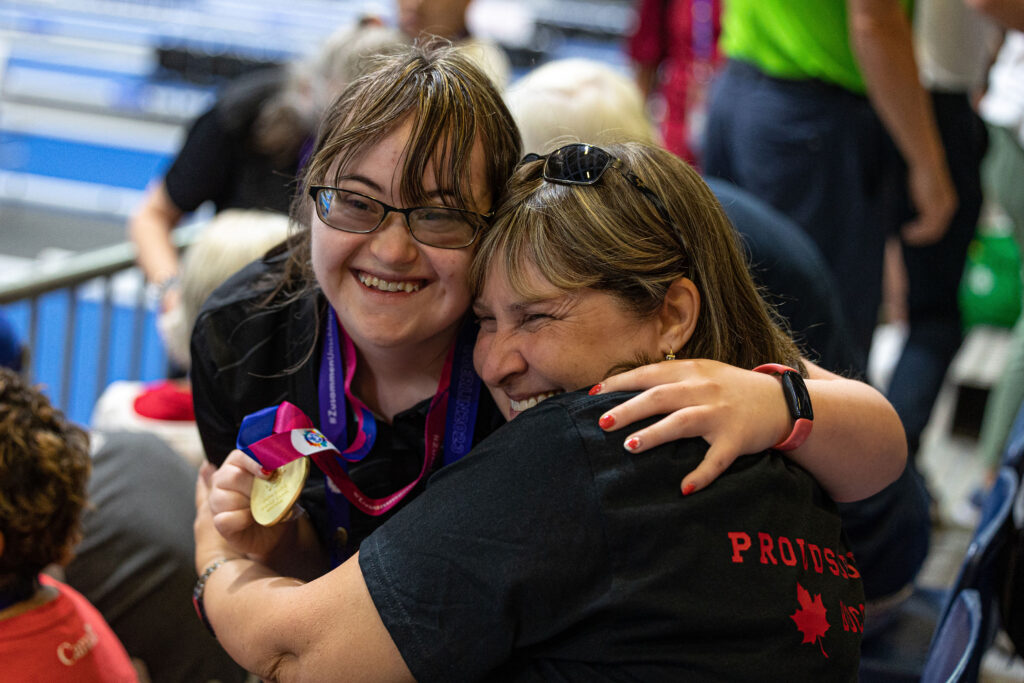
That’s where the road to Special Olympics World Summer Games 2023 started, with family and finding community at Special Olympics Burlington. Though the Strembles live in Dundas, they have found that Burlington’s Special Olympics is a younger group, all the better for 21-year-old Laura to make friends.
The next step in this Olympics journey began while COVID restrictions were still in place, so the regular hometown games leading up to choosing the final team were not happening. Instead, coaches recommended particular players, who were then entered into a lottery system.
It was over a year ago when Laura was recommended by coaches Dave and Mike. After that initial endorsement, Laura’s name was chosen to go through the first round. Joanne and her husband received a call from Special Olympics at that point, while they were on vacation, asking “tons and tons of questions” about Laura’s ability to travel on her own and other things, before the final decision about putting Laura through to go to Berlin. And then Joanne couldn’t tell Laura that she’d made Team Canada until it was officially announced — nearly a month later.
And then the training began, though a bit later than they’d hoped: they couldn’t find any indoor bocce courts over the winter, so training had to be compressed into those few pre-Special Olympics months when the outdoor courts were open.
On top of that, the Strembles knew that the bocce court at Special Olympics Berlin would be astroturf, but in Burlington, they play on gravel, throwing to get their red or green balls as close to the pallina, the little white ball, as possible. (“If you hit the pallina in the front, you get an extra point,” explains Laura). The Croatian Community Centre in Stoney Creek stepped up, generously offering Laura the use of their astroturf bocce course for her Olympic training. She began in April of this year, training three or four days each week, through wind, rain, heat, cold, “even a blizzard,” says Laura.
Team Canada also had a website, “Training Central,” as Joanne says, where the team input data about their health, diet, exercise, and sleep, to help keep the team motivated and accountable, complete with athlete “scoreboard.” (Laura, followed by her bocce doubles teammate, Jenny Adams, climbed the board and were consistently in the top three.) There were Zoom meetings to “meet” teammates, who hail from across Canada.
Team Canada runs a tight ship. Joanne says that as well as Training Central, which kept the athletes on track via the scoreboard in making sure they drank enough water, did their exercises, got enough sleep, and so on, they had compression socks and Pedialyte for the athletes for the plane ride, as well as a pre-flight regimen of progressively earlier wake-up times to help them prepare for the long flight and the time difference. “It was pretty tough,” Laura recalls, and is glad to be done with Training Central. (For now: Joanne reminds her that it’ll be back for provincials. “Oh boy,” says Laura, rolling her eyes.)
Next up on the journey to the Special Olympics was Laura’s first trip away from her family, to Toronto for her very first training camp. There, she got to meet her teammates and Team Canada staff in person, as well as train together. “It was pretty cool,” says Laura. Then the team was on the plane to another training camp, this time in Vancouver. (Also “pretty cool,” says Laura.) And then there was another plane ride, this time to Munich, with more training “and some touristy stuff.”
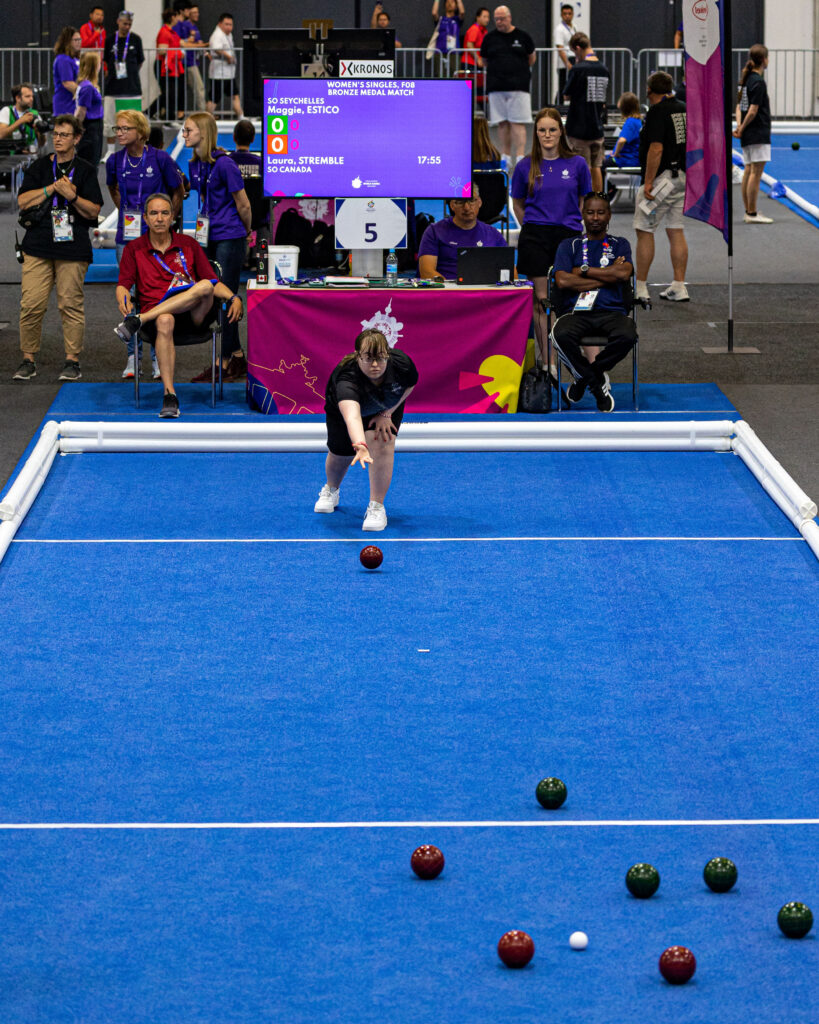
And then, the big one: on to Berlin for the 2023 Special Olympics, from June 17 to 25.
With 190 participating countries, 7,000 athletes, and 20,000 volunteers, you’d think that Laura might have been a bit nervous. But no, not at all: “It was pretty cool to play in front of thousands of people,” Laura says.
Laura describes the opening ceremonies, walking around the track in her Team Canada uniform, waving at the crowd. “It was awesome.” Laura loved meeting the athletes from other countries, and the recognition from the city for the Special Olympics: “Everywhere I went, there were tons of flags and signs, all over the bus stops, too.”
While Laura’s whole family was in Berlin to cheer her on, Team Canada was sequestered in their hostels and hotels (depending on their sport and where they were playing) and only saw their families in the stands at the games.
By the sound of it, though, the athletes wouldn’t have had time to hang out with their families until after the games anyway: the four days of competition were non-stop. Plus, there was hand-washing of uniforms and cheering on teammates to do in any spare moments (the hand-washing necessitated by the hotel’s three-day laundry turnaround, which wouldn’t work with Laura’s two uniforms and packed competition schedule).
The first day required divisioning, as in the Special Olympics, there are different divisions depending on ability. Then the next day, there was the bocce teams competition (where each team has two men and two women), with three games; then doubles, with three games and a final. At 2 p.m. on that same day, was the teams finals, and at 4:55 p.m., the women’s doubles finals. By then, Laura had been playing the entire day, with no time for lunch, so she and Jenny went in tired. Joanne describes seeing them throw that first ball and realizing, “We can do this!” She saw a sudden burst of energy in Laura and Jenny that helped them defeat the Guyanese team with a final score of 9–4, earning them that gold medal.
The next day was just as busy, with the women’s singles finals, the women’s doubles awards ceremonies, and the women’s singles awards ceremonies all on the same day, capped off by Laura’s bronze medal in women’s singles.
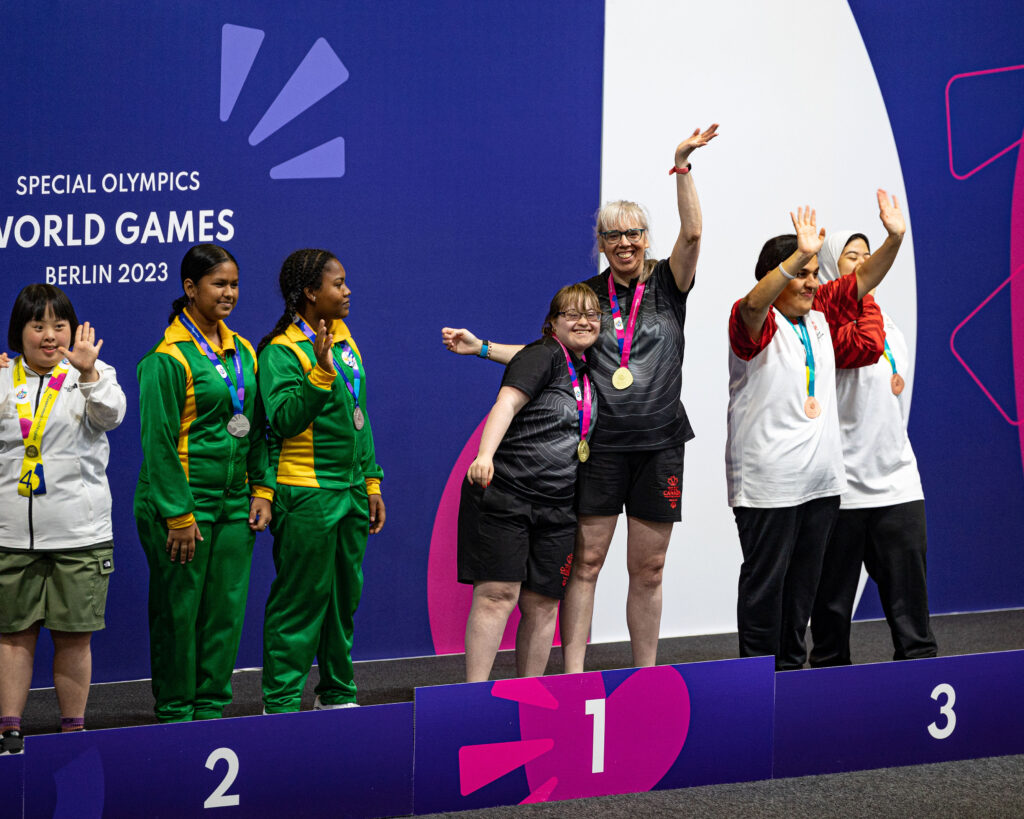
Laura recalls the moments after receiving all that shiny hardware: “As soon as I got my medals, went back to the stands to my family to show them, they were so proud!”
Because of that first-place doubles win, Laura also got to bring home the coin that was tossed at the beginning of the bocce games to decide which team uses the green balls and which uses red. Only gold medal winners get to keep that coin, and it is specially designed for each Special Olympics. This year’s is embossed on the back with the Special Olympics 2023 motto: unbeatable together.
And now Laura is back home, playing soccer and bocce, and getting ready for her next round of competition. But it’s not all sport for Laura: this ambitious and driven young woman has recently graduated from Mohawk College, where she did a three-year culinary program called Community Integration Through Co-operative Education, sits on the board of the Down Syndrome Association of Hamilton, and has a cricut business with her mom, where they make and sell T-shirts, ornaments, cards, “really cool projects,” says Laura (you can see some of these on Laura’s Instagram account, @inspirationsbylauras). She also loves to spend time with her family, go camping in the family’s trailer, swim, and ride on the family’s Sea-Doo. And of course, Laura also loves to hang out with her friends; on the day we spoke, Laura was looking forward to the evening, for a well-deserved night out to celebrate her big wins with friends.
And what’s next? “Get a job!” Laura says, who lost her previous job due to the pandemic. And find a place for those medals. “We’re looking at options,” Laura notes. Especially, Joanne adds, because “we’re thinking this may not be the last set of medals.” From all we’ve heard from Laura today, that may be an understatement.

